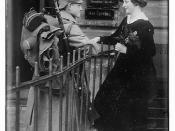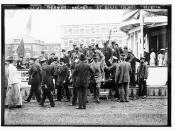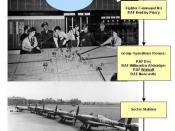The Battle of Britain was the aerial conflict between British and German air forces in the skies over the United Kingdom in the summer and autumn of 1940. It was one of the most important moments in Britain's twentieth century history and a decisive turning point of the Second World War. Royal Air Force Fighter Command defeated the Luftwaffe's attempt to gain air control over southern England and saved Britain from German invasion and conquest.
The key to success for the Luftwaffe was the destruction of the RAF's fighter force. Conversely, for Fighter Command it was to hamper bombing and inflict losses, preferably before the target was reached. The campaign itself was marked by several distinct phases. As the battle developed, the Luftwaffe attacked targets moving further and further inland from coastal shipping to forward fighter airfields and radar stations, 11 Group sector airfields and finally London.
The crucial period of the battle was between 24 August and 15 September.
Fighter Command came closest to losing when its vital sector airfields around London were attacked. The decisive turning point came on 7 September when the Luftwaffe switched its attention to the capital. This tactical blunder allowed Fighter Command to recover its strength rapidly to inflict, on 15 September, losses significant enough to show the Germans the battle could not be won.
British Fighter Aircraft
The most potent element of the air defences during the Battle of Britain was provided by the excellent fighter aircraft which were the backbone of Fighter Command, the Hurricane and the Spitfire.
Luftwaffe
In 1940, the German Air Force or Luftwaffe was the largest and most formidable air force in Europe. The organisation of the Luftwaffe was very different from the Royal Air Force. Whereas the latter had branches based on function, such as Fighter...



Battle of Britain
You've written a good essay about one of the most momentous battles in military history and need only to add a bibliography. When most people think of battle, they imagine armies and armored units. As you point out, the Battle of Britain was an air war which England won because of the stupidity of the German high command in changing tactics just when the British defenses were about to break. For the Luftwaffe to switch from military to civilian targets because of retaliation for the bombing of Berlin was fortunate for England indeed. After the Nazi conquests early in World War II, England stood alone against Germany in 1940 with the valiant flyers of the RAF as security against any invasion of the island by the Nazis. In referring to the stalwart RAF aviators who flew mission after grueling mission though terribly fatigued, Churchill was correct in observing that never have so many owed so much to so few.
5 out of 5 people found this comment useful.